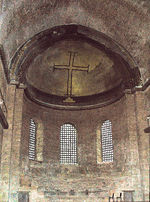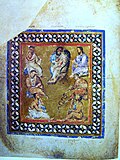Byzantine studies is an interdisciplinary branch of the humanities that addresses the history, culture, demography, dress, religion/theology, art, literature/epigraphy...
22 KB (2,392 words) - 11:26, 8 October 2024
The Byzantine Greeks were the Greek-speaking Eastern Romans throughout Late Antiquity and the Middle Ages. They were the main inhabitants of the lands...
90 KB (10,875 words) - 19:29, 22 October 2024
The Byzantine Iconoclasm (Ancient Greek: Εἰκονομαχία, romanized: Eikonomachía, lit. 'image struggle', 'war on icons') were two periods in the history...
58 KB (7,816 words) - 23:00, 28 October 2024
Byzantine art comprises the body of artistic products of the Eastern Roman Empire, as well as the nations and states that inherited culturally from the...
62 KB (6,849 words) - 18:43, 25 August 2024
Neo-Byzantine architecture (also referred to as Byzantine Revival) was a revival movement, most frequently seen in religious, institutional and public...
24 KB (2,340 words) - 01:10, 22 September 2024
The Byzantine Empire, also referred to as the Eastern Roman Empire, was the continuation of the Roman Empire centred in Constantinople during late antiquity...
242 KB (26,415 words) - 06:12, 4 November 2024
Society for the Promotion of Byzantine Studies (SPBS) is a scholarly society established in 1983 "with the object of furthering study and knowledge of the history...
2 KB (165 words) - 02:31, 2 February 2024
Byzantine–Norman wars Byzantine–Seljuq Wars Byzantine–Georgian wars Byzantine–Mongol alliance Byzantine–Ottoman Wars Byzantine studies List of Byzantine_scholars Edward...
17 KB (1,539 words) - 17:52, 31 October 2024
Medieval Greek (redirect from Byzantine Greek language)
language and literature is a branch of Byzantine studies, the study of the history and culture of the Byzantine Empire. The beginning of Medieval Greek...
57 KB (6,383 words) - 14:09, 20 October 2024
Roman usurpers List of Byzantine usurpers Succession to the Byzantine Empire List of Roman and Byzantine empresses List of Byzantine emperors of Armenian...
83 KB (1,662 words) - 09:53, 3 November 2024
The Hellenic Institute of Byzantine and Post-Byzantine Studies in Venice (Italian: Istituto Ellenico di Studi Bizantini e Postbizantini di Venezia, Greek:...
3 KB (273 words) - 16:53, 22 October 2024
Dumbarton Oaks (redirect from Dumbarton Oaks Center for Byzantine Studies)
is dedicated to supporting scholarship in the fields of Byzantine and Pre-Columbian studies, as well as garden design and landscape architecture through...
42 KB (5,341 words) - 23:00, 9 October 2024
The Byzantine calendar, also called the Roman calendar, the Creation Era of Constantinople or the Era of the World (Ancient Greek: Ἔτη Γενέσεως Κόσμου...
85 KB (11,472 words) - 06:49, 2 November 2024
The Byzantine army was the primary military body of the Byzantine armed forces, serving alongside the Byzantine navy. A direct continuation of the Eastern...
106 KB (13,682 words) - 09:50, 17 September 2024
of Byzantine Studies, Cambridge, March 1990. Aldershot, England: Variorium. pp. 25–39. ISBN 0860783383. Dennis, George T. (1985). Three Byzantine Military...
12 KB (1,252 words) - 09:41, 20 October 2024
(2008). The Byzantine Province in Change: On the Threshold Between the 10th and the 11th Century. Belgrade: Institute for Byzantine Studies. ISBN 9789603710608...
65 KB (8,077 words) - 01:40, 10 September 2024
International Association of Byzantine Studies (French: Association Internationale des Études Byzantines, AIEB) was launched in 1948. It is an international...
6 KB (527 words) - 18:25, 31 October 2024
Byzantine currency, money used in the Eastern Roman Empire after the fall of the West, consisted of mainly two types of coins: gold solidi and hyperpyra...
19 KB (1,976 words) - 16:58, 19 September 2024
For most of its history, the Eastern Roman (Byzantine) Empire did not use heraldry in the Western European sense of permanent motifs transmitted through...
42 KB (5,172 words) - 07:53, 24 October 2024
Greek, Roman, and Byzantine Studies is a quarterly peer-reviewed academic journal established in 1958 by John J. Bilitz. It is published by Duke University...
1 KB (93 words) - 16:33, 29 April 2023
Byzantine music (Greek: Βυζαντινή μουσική, romanized: Vyzantiné mousiké) originally consisted of the songs and hymns composed for the courtly and religious...
182 KB (20,602 words) - 19:21, 23 October 2024
term Byzantine commonwealth was coined by 20th-century historian Dimitri Obolensky to refer to the area where Byzantine general influence (Byzantine liturgical...
7 KB (674 words) - 15:32, 23 September 2024
antiquity never ceased to be cultivated in the Byzantine Empire because of the impetus given to classical studies by the Academy of Athens in the 4th and 5th...
25 KB (2,842 words) - 16:23, 25 July 2024
the World Council of Churches and the International Association of Byzantine Studies, as well as numerous international leaders, while several Muslim leaders...
228 KB (25,706 words) - 22:22, 2 November 2024
Byzantium (redirect from Byzantine crescent)
Elizabeth and Michael, and Moffatt, Ann, Byzantine Papers: Proceedings of the First Australian Byzantine Studies Conference, Canberra, 17–19 May 1978 (Australian...
23 KB (2,557 words) - 21:55, 2 November 2024
The Byzantine economy was among the most robust economies in the Mediterranean for many centuries. Constantinople was a prime hub in a trading network...
52 KB (6,287 words) - 21:15, 28 October 2024
Post-Byzantine Studies in Venice University of Chile Center for Byzantine and Neohellenic Studies European Society of Modern Greek Studies Byzantine and...
3 KB (351 words) - 07:45, 31 October 2024
théma) were the main military and administrative divisions of the middle Byzantine Empire. They were established in the mid-7th century in the aftermath...
54 KB (4,145 words) - 09:09, 23 October 2024
Constantinople (redirect from Byzantine Constantinople)
Constantinople remained the capital of the Eastern Roman Empire (also known as the Byzantine Empire; 330–1204 and 1261–1453), the Latin Empire (1204–1261), and the...
133 KB (11,628 words) - 09:39, 24 October 2024
Fall of Constantinople (redirect from End of the Byzantine Empire)
the conquest of Constantinople, was the capture of the capital of the Byzantine Empire by the Ottoman Empire. The city was captured on 29 May 1453 as...
114 KB (12,882 words) - 22:50, 4 November 2024



















